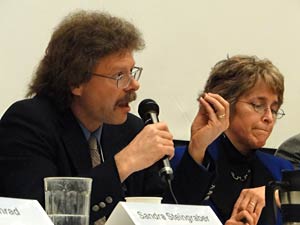Getting drillers to respect the environment
Publication Type:
Newspaper ArticleSource:
The Tompkins County Weekly (2011)URL:
/frack_files/Pages_from_TompkinsWeekly110404.pdfKeywords:
expertsNotes:
"Our quality of life has an unquenchable thirst for energy. Offshore drilling and production helps to satisfy this thirst." --Richard Haut
Extracting energy requires trade-offs. “We want clean air, but we also like the convenience of electricity,” said Richard Haut during a lunch-hour seminar last Tuesday. Haut, founder and senior research scientist at Houston Advanced Research Center (HARC), visited Cornell to promote what he calls “environ- mentally friendly drilling systems.”
But his talk left many people hungry for answers...
Haut embraces the idea that drilling is coming and the only question is how to minimize the damage. Take hydraulic fracturing: about 50 percent of all wells drilled into shale, tight gas and coal-bed methane formations use fracking. Within 25 years, he said, 75 percent of all gas wells will be fracked.
“But the typical frack site is an accident waiting to happen,” Haut said, pointing out potential spills, pit leaks and heavy truck traffic. Another issue is dealing with flow- back and produced waste fluids. Haut showed examples of mobile treatment units but never described the technology under development...
The problem with Haut’s environmentally friendly drilling approach, says Cornell engineering professor Tony Ingraffea, is that it reflects the worldview that shale gas development is inevitable, so we just have to “do it right.” This precludes true scientific investigation of many issues that this development presents, he said, noting that instead it focused on technology, such as how to build a well less likely to leak. “Such a view is also an admission that the thousands of shale gas wells already made, and those underway now, are not ‘being done right’,” Ingraffea said.
Physicist Bill Podulka agrees.
“The wide array of acknowledged problems and lack of currently available solutions underscores what many gas drilling critics have been saying: this technology is not ready.” What was missing, Podulka says, is discussion about excluding drilling from areas too socially or environmentally fragile. Instead, he said, the context boiled down to “how do we allow business as usual while bringing environmental damage down to a level we can tolerate?”
See: Gasland - The Debate







